Search the Special Collections and Archives Portal
Search Results
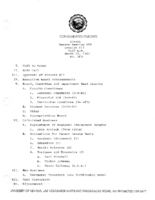
Meeting minutes for Consolidated Student Senate, University of Nevada, Las Vegas, March 15, 1983
Date
Archival Collection
Description
Text
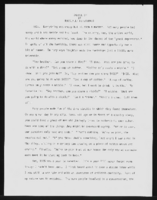
"Saddle Up": article draft by Roosevelt Fitzgerald
Date
Archival Collection
Description
From the Roosevelt Fitzgerald Professional Papers (MS-01082) -- Drafts for the Las Vegas Sentinel Voice file. On Black individuals serving in the U.S. military historically and now.
Text
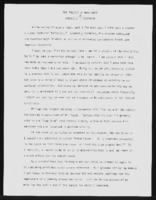
"The Fallacy of Hard Work": article draft by Roosevelt Fitzgerald
Date
Archival Collection
Description
From the Roosevelt Fitzgerald Professional Papers (MS-01082) -- Drafts for the Las Vegas Sentinel Voice file. On lack of work opportunity for people of color.
Text

Chris Lee oral history interview: transcript
Date
Archival Collection
Description
Oral history interview with Chris Lee conducted by Cecelia Winchell and Stefani Evans on December 14, 2021 for Reflections: The Las Vegas Asian American and Pacific Islander Oral History Project. Judge Chris Lee reflects on the lives of his parents, their occupations and experiences during the Korean War, and his family's decision to immigrate from Incheon, South Korea to Las Vegas. He recalls memories from his childhood visiting family in Korea, Korean traditions and food, his educational pursuits, and the livelihood of his parents after immigrating. Chris also shares details of his employment history as Deputy District Attorney for the Clark County District Attorney's Office, as Deputy Secretary of State for Southern Nevada, as the first Asian American elected to the Clark County Justice Court bench, and presently as Judge in Department 1 of the North Las Vegas Municipal Court.
Text

Meeting minutes for Consolidated Student Senate, University of Nevada, Las Vegas, July 22, 1980
Date
Archival Collection
Description
Text
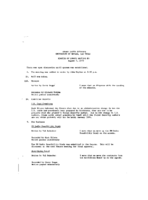
Meeting minutes for Consolidated Student Senate, University of Nevada, Las Vegas, August 1, 1973
Date
Archival Collection
Description
Text
Johnny LaVoie Papers on the Culinary Workers Union Local 226
Identifier
Abstract
The Johnny LaVoie Papers on the Culinary Workers Union 226 (1958-1993) contain photographs of Culinary Union meetings; Culinary Union strikes at the MGM Hotel, Frontier Hotel, and other Las Vegas, Nevada hotels; agreements; by-laws; and Culinary Union collective bargaining booklets. Also included are negatives that correspond to the photographs, audiovisual material, newsletters from the Culinary Union and Catering Industry Employees, pins, buttons, and postcards.
Archival Collection
Wilbur and Toni Clark Papers
Identifier
Abstract
The Wilbur and Toni Clark Papers date from 1944 to 1991, with the bulk from 1953 to 1963 and document the lives of Wilbur and Toni Clark in Las Vegas, Nevada and the development of the Desert Inn Hotel and Casino. The collection includes correspondence from Wilbur Clark to those he identified as important individuals including government officials and celebrities. It also includes materials related to Clark’s plan of building luxury apartments near the Desert Inn, and newspaper clippings and scrapbooks about the Clarks and the Desert Inn. The collection contains some audiovisual materials including Wilbur and Toni Clark's home movies, news footage, and film footage of Las Vegas, Nevada and the Desert Inn.
Archival Collection

Transcript of interview with Raymonde Fiol by Barbara Tabach, August 12, 2015
Date
Archival Collection
Description
In this interview, Fiol discusses her experience as a a hidden child in the Holocaust and her family's history. She also talks about her involvement with the Las Vegas Holocaust survivors group.
Raymonde "Ray" Fiol is president of the Holocaust Survivors Group of Southern Nevada. A Jewish Holocaust survivor whose parents were killed in Auschwitz, Fiol was hidden by a Christian family of Resistance fighters during her childhood in Nazi-occupied Paris, France. She married American serviceman Phil Fiol and left Paris in 1957. The couple lived in New York City where she worked in inventory control. She retired to Las Vegas, Nevada around 2003 and became active in the local Holocaust Survivors Group. In 2007, she became president of the organization, which provides essential services to Holocaust survivors and helps them share their stories. Fiol is also a member of the Nevada Governor?s Advisory Council on Education Relating to the Holocaust and the coordinating council of Shoah International. Her dedication to preserving the memory of the Holocaust and caring for survivors earned her the Nevada Senior Citizen of the Year award from the Nevada Delegation of the National Silver Haired Congress and the Aging Services Directors Organization in 2014, and in 2013 she was named Mensch Volunteer of the Year by the Jewish Federation of Las Vegas. In this interview, Ray reflects upon her traumatic childhood experiences, and shares how she learned details of her family?s history from a woman in France who had researched the destiny of the local Jewish community. She also discusses her involvement with the survivors group, and the positive impacts of its outreach activities, as well as goals to ensure future generations learn about, and from, the Holocaust.
Text
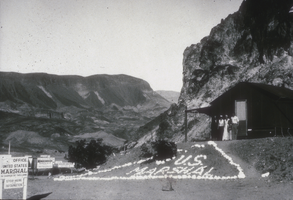
Slide of United States Marshal Claude Williams and his family outside of his office, Nevada, April 18, 1931
Date
Archival Collection
Description
Image
